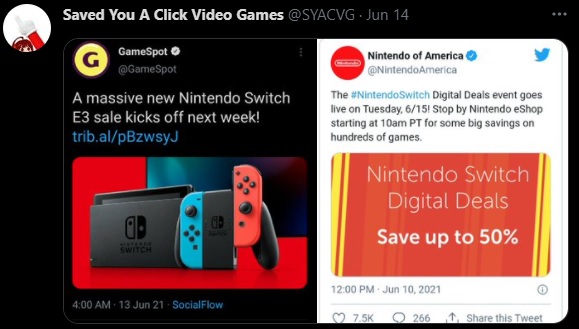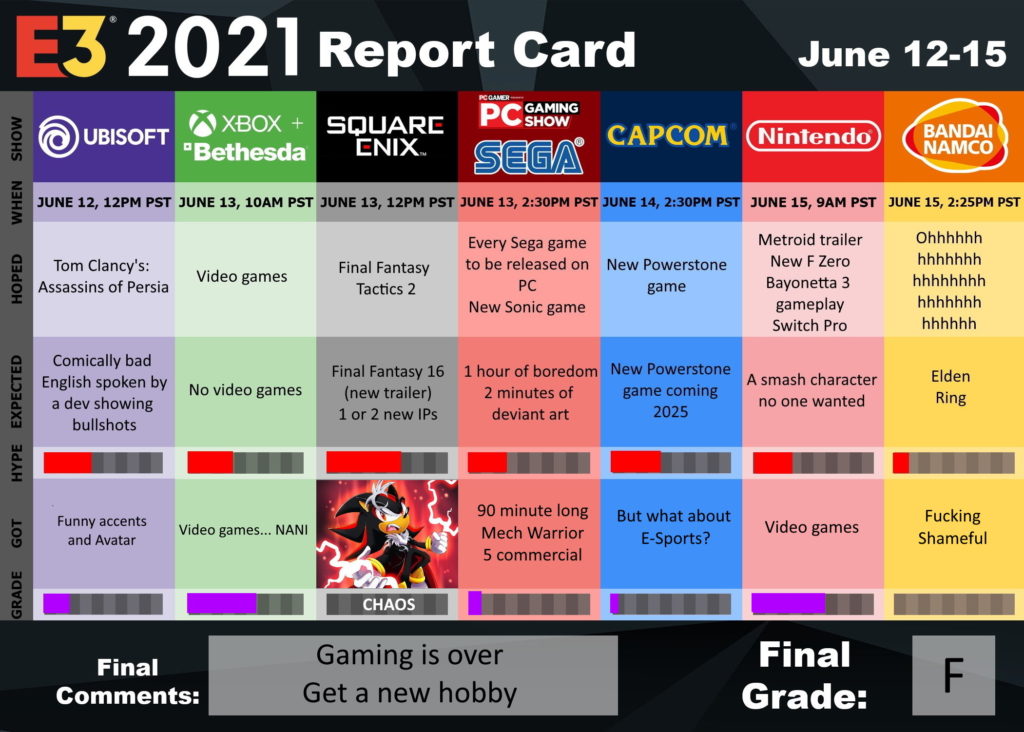Just over two years ago I wrote a diatribe called ‘The Absolute State of Video Games’ that covered various aspects of the gaming industry. One that I covered towards the end was the increasing irrelevance of gaming media as publishers and developers are now able to deal very directly with their customers through websites like YouTube and Twitter among many others. A number of large gaming websites have gone bust over the last decade and the ones that remain increasingly focus on comics, film, television and popular culture and far less exclusively on video games.
There has also been an increase in political/social activism which I would argue really began around 2012 and became very obvious with #GamerGate a few years later. This was initially thought to be clickbait for their dwindling audiences and while this was somewhat true, it was more than this. Seeing articles like, ‘How I learned to embrace Lesbianism playing Sega Bass Fishing on Dreamcast’ certainly provokes curiosity from potential readers but behind this was a concerted effort to converge the medium as well as the industry. These people were all entryist wreckers whether they were conscious of it or not.
The last time I wrote on this subject, a commenter claimed that this was simply the result of more educated writers taking a more critical eye on the industry. This is an absurd claim as most of these articles are more about the writer than the medium as my thankfully fake but all too plausible example above shows. The topic is less video games but the writer’s own interests grafted awkwardly onto video games. These writers mostly do like video games in much the same way as the average person likes watching television. Their main interests lie elsewhere though and this is simply a vehicle to voice them. And one they will (and do), abandon when the first more lucrative opportunity presents itself. The remaining employees that have a genuine interest in the industry have either acquiesced to the changes to their working environment or are no longer part of it. The genuinely in-depth and thoughtful journalism I’ve read has almost been done by freelance writers and rarely the employed staff.
This transition coincided with these website’s articles becoming little more than facsimiles for publisher press releases. Many articles today (do go look for yourself), are simply embedded tweets, YouTube videos or quotes of press releases with a brief editorial to make it appear as more. Worse still, the writers often hide the information from the headline as a flagrant way to maintain web traffic. This practice is so ubiquitous that I am sure parent companies have insisted on it as a way to prevent the continued loss of readers and advertising.
 Why not go straight to the source?
Why not go straight to the source?
If you’re wondering how any of this can be accurate since many of these websites still exist, well this is largely due to the parent companies just mentioned. They can afford to make losses so as to maintain a presence in the industry. There are only a handful of prominent websites that aren’t owned by a much larger parent media company with several more reliable income streams holding the website up. Nearly every major gaming website would go down within a few years of been cast out on their own and many will anyway.
This brings us finally to E3 2021
The RazörFist rant that inspired this one.
E3 began in 1995 when the Internet was still a curiosity and most dedicated gamers got their news either by word of mouth or through gaming magazines. I can remember the first time I heard about E3 which must have been in 1996 when I saw little images of the ultimately cancelled Sonic X-treme on Sega Saturn among other games — in a magazine. It was simply a tradeshow for companies to promote their wares and one way to do that was by inviting journalists to help disseminate new products as this was free or at the very least; a cheap way to advertise. This continued to be the case when magazines started going under and/or moving onto the increasingly popular and influential Internet. Most people couldn’t get to E3 or get direct information from these companies so journalists remained necessary middle-men.
As internet traffic increased, so did forums and websites dedicated to different subjects. This was where hobbyists could discuss games directly and insider information could be shared. Gradually gaming websites began sharing leaks found on these websites and later on social media. More and more hobbyists began getting access to E3 and eventually it became something the general public attended too. When Internet speeds increased and video and streaming content became more popular, it wasn’t even necessary to go as you could watch the show from home. All this saw the roles of journalists diminish and this was well over a decade ago now. The companies involved seemed to recognise this at the time and from 2007-08 E3 was reduced significantly in scope. The original format returned in 2009 by popular demand but this was the beginning of what should have been the end.
In 2011 Nintendo began their Nintendo Direct streams and these were soon to be their main presence at E3 as their stage shows ceased. Other companies have followed suit and as far as I know, almost all involved simply had live events during the show. Journalists may have been unhappy with the involvement of “fans” at E3 before but their presence was simply a sign that the middle-men were fast becoming irrelevant. If the fans are buying the video games, the merchandise and had genuine enthusiasm, why should companies give it away for free to journalists? The former were effectively paying to do what the journalists got paid for.
I’ve been charitable up to this point referring to them as journalists but early gaming magazines and websites were mostly just an extended arm of advertising. Now that journalists will just as soon criticise your game for not being “diverse” regardless of the game’s quality and after receiving a review copy, why should companies care to make use of them at all? It is a practice that now exists more out of habit and plenty of companies have been wising up in the last few years and declining to hand out review copies at all.
For the last few years, there have been very little exciting announcements at E3. One reason is the constant problems with leaks which journalists spread as another form of clickbait “news” which they source from enthusiast forums. Another are the easy ways to disseminate actual news without journalists. A big trade show is now simply unnecessary. This year was probably the worst.
There were very few exciting announcements this year and I doubt it was because publishers had nothing to announce. There is simply no point in announcing anything until they deem it ready and E3 is no longer an ideal place to do it. Most of these companies could arguably have got more traction by making the announcements they did at another time. I wrote about E3 in 2017 and that was also the last show that I recall being somewhat exciting and probably only because it followed a few months after the Nintendo Switch launched. Sony has all but left the show and most publishers this year may as well have not bothered at all.
The industry now needs E3 as much as it needs gaming journalists. It is easier and cheaper for them to post news on social media with a link to a YouTube video than spend millions on a tradeshow. It is also much preferable to sending a package to a mentally ill millennial who’ll give their games bad press at the slightest hint of offense to a minority group. That one tweet will get picked up and shared by people who are actually enthusiastic and the news will spread organically for no more expense than the salary of the employee assigned to tweet it. Nothing more is needed. E3 has existed for twenty five years which is a very good run for any event and so also a good milestone on which to bring it to an end. After this year, it won’t be missed.

